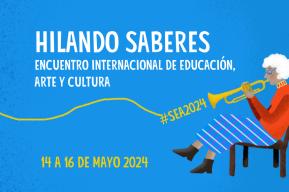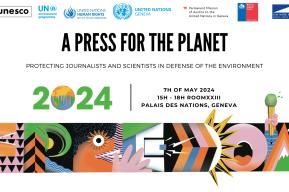News
The UNESCO celebrates Chile's 70th anniversary as a member state and presents cooperation strategy for the period 2023-2027

The ceremony took place at the Ministry of Foreign Affairs headquarters, and was attended by Chile's Foreign Minister, Alberto van Klaveren; the Minister of Culture, Arts and Heritage, Jaime de Aguirre; the Minister of Sport, Jaime Pizarro, as well as undersecretaries and other officials from various ministries and government institutions that closely work with this United Nations agency.
The cooperation strategy for the next four years will highlight the valuable contribution that UNESCO makes in Chile, through technical advice, experience exchange, and the creation of international alliances. "When we assumed this great responsibility, we knew from the first day that one of our strategic allies would be UNESCO. Not only because of the Organization's extensive track record, but also because of the harmony we find within a shared agenda of common principles and values, where human rights, sustainable development, and gender equality are the basis of each of our actions," said Marco Antonio Ávila, Minister of Education.
The Director of OREALC/UNESCO Santiago, Claudia Uribe, expressed her gratitude to Chile for its commitment and cooperation with UNESCO over the years. In this new phase of cooperation between Chile and UNESCO, they will seek to strengthen interministerial coordination to further enhance joint work in key areas such as education, science, culture, communication, and information. In addition, they will promote Chile's active participation in regional and international instances to strengthen international law, defend human rights, and promote international cooperation.
“We are working hand in hand with various sectorial ministries. Thanks to them, we have planned significant milestones and important lines of work, such as the organization of the Regional Summit on the Ethics of Artificial Intelligence. In education, with the strong and ongoing work we maintain with the Ministry of Education around the Education Reactivation Plan, we also have planned an Extraordinary Meeting of Ministers of Education in Latin America and the Caribbean, which will be led by the Minister of Education. Also, with this same ministry, the organization of an important pedagogical congress that will convene multiple national and international actors,” stated Claudia Uribe.
Since 1963, Chile has housed the Regional Bureau for Education in Latin America and the Caribbean (OREALC/UNESCO Santiago), which has played a fundamental role in monitoring and providing technical support to countries in the region. Furthermore, Chile is a member of the UNESCO Executive Council (2021-2025); the Committee for the Protection and Promotion of Cultural Diversity for the period 2023-2027, and Chile's mission to UNESCO is responsible for coordinating the Latin American and Caribbean Education Working Group (GRULAC), to name a few instances led by this Andean country.
Chile joined UNESCO in 1953, with the National Commission being located at the Ministry of Education, through the MINEDUC's Office of International Relations. From the Commission, among the many areas that encompass UNESCO's work, it has contributed to positioning the Chilean State in the multiple multilateral and regional dialogue mechanisms that exist in the educational sphere, actively participating in advancing towards SDG-4 for Quality Education, led by UNESCO, in the context of the 2030 agenda. To carry out all this work, the role played by the permanent Mission of Chile to UNESCO, a body of the Foreign Ministry tasked with representing our country before the organization's authorities at its headquarters in Paris, is fundamental.








